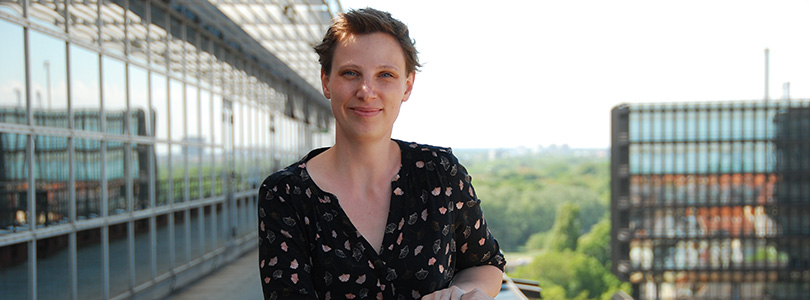Content
On the International Day of Women and Girls in Science


„Every day you are surprised anew by the ideas that applicants have. As a patent examiner, I am already working on what will move society in the coming years. It's fun to work on the pulse of the latest patent applications.“
Patent examiner interview - Dr. Veronika Semel, patent examiner in the field of basic electrical components, batteries, automotive electrics.
DPMA:What special prior knowledge, skills and interests do you need for your profession?
Dr. Veronika Semel :You need an interest in natural sciences and technical contexts as well as a keen perception. You acquire the relevant skills for my profession by studying engineering or natural sciences. In addition, you are very well prepared for your daily work at the German Patent and Trade Mark Office by qualifying as a patent examiner. Here you also acquire the necessary legal know-how.
DPMA:What did you study and at which university?
VS:I studied materials science at the Friedrich-Alexander University Erlangen-Nuremberg, followed by a doctorate in the field of semiconductor materials at the Fraunhofer Institute for Integrated Systems and Device Technology (Fraunhofer IISB) in Erlangen.
DPMA:What made you decide to pursue this degree?
VS:The trigger was certainly a visit to the bionics exhibition at the Lokschuppen in Rosenheim: the exhibits of this interdisciplinary science excited me so much that I considered a technical degree. A conversation about career prospects with acquaintances of my parents finally drew my attention to the study programme in materials science.
DPMA:What advice do you have for girls and young women who are considering studying a STEM subject?
VS:Don't be afraid! Boys don't have better skills than you! You will enjoy studying and the students will quickly grow together into a homogeneous group that will master the challenges of studying together.
DPMA:What projects are you currently working on?
VS:Currently, I am in the process of qualifying as an independent patent examiner. However, in principle, we do not work on projects here, but examine new patent applications.
DPMA:What is your typical working day like?
VS:I like to start my working day early. First, I open the electronic file of a new patent application and record its contents. The individual patent applications are very different and I often spend the first few minutes marvelling at the new ideas. Then I research the patent literature (i.e. the patents published worldwide), the internet and books or journals to find out the worldwide state of the art for the current patent application. The work here resembles scientific detective work and can sometimes take an entire day. Finally, I assess whether the current patent application is new (does the subject-matter of the application already exist?) and inventive (is the subject-matter of the application obvious to a person skilled in the art?) compared to the prior art searched. I put the result on paper and send a letter to the patent applicant.
All in all, I really appreciate the fact that I have regular working hours as a patent examiner.
DPMA:Is it more difficult for a woman to work in a rather male-dominated field? What experiences have you had in this respect?
VS:No! The professional requirements are not gender-specific. I find the cooperation with male colleagues refreshing and fortunately I have never been given the feeling of working as a woman - in the sense of being special - in a male-dominated professional field. Rather, I have always felt part of a community.
DPMA:What fascinates you most about your work?
VS:My field of work is very exciting. For example, I test new operating elements on cars, such as operable displays with 3-D display or control with gestures. You are surprised every day by the ideas applicants come up with. As a patent examiner, I'm already working on what will move society in the next few years. It is fun to work on the pulse of time with the latest patent applications and to be allowed to assess technical innovations with regard to their patentability.
DPMA:How do you manage to combine work and family life?
VS:I share the family tasks with my husband, who works as an engineer in the private sector. In this way, everyone can realise their professional goals and the family does not take a back seat.
Last updated: 17 July 2024

Not only protecting innovations
Social Media